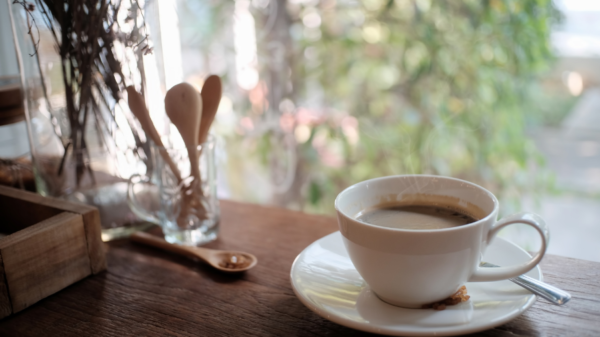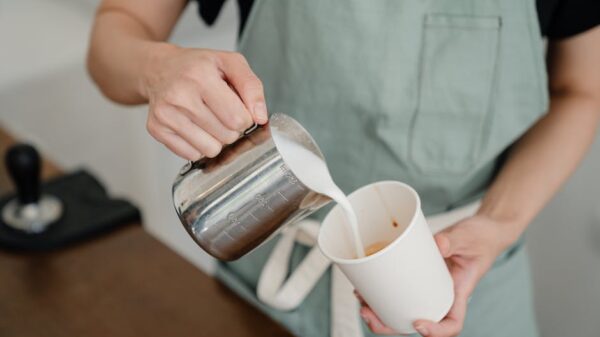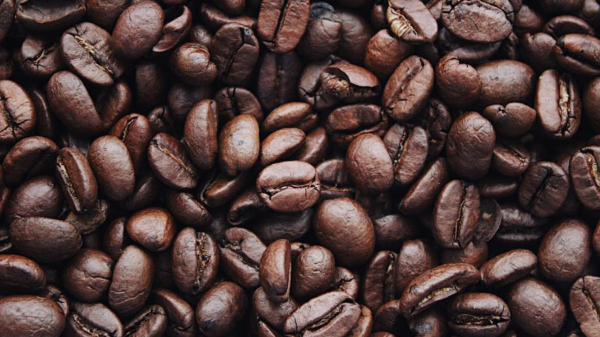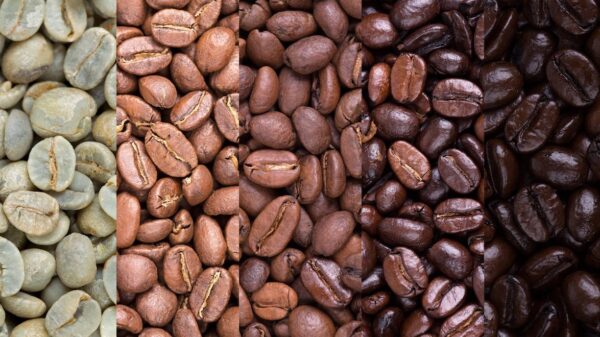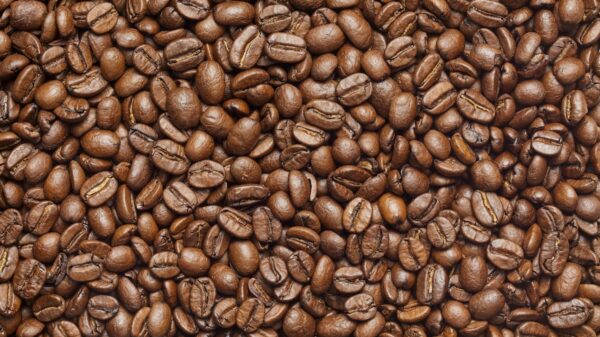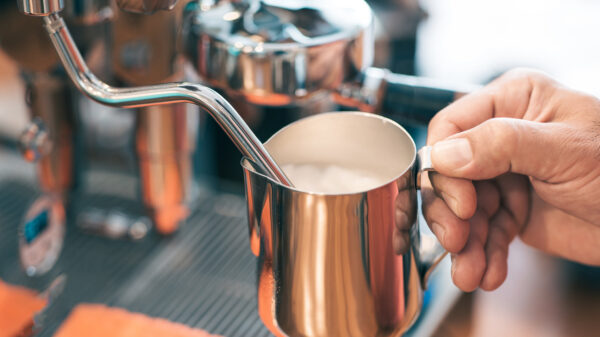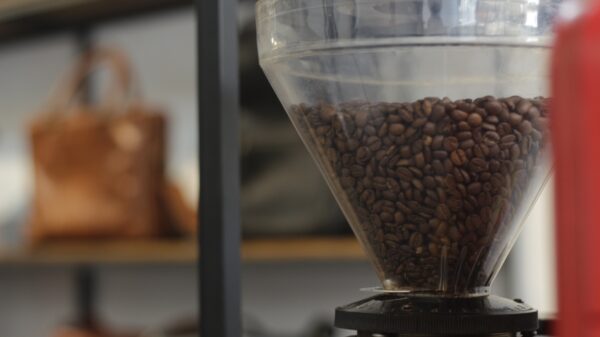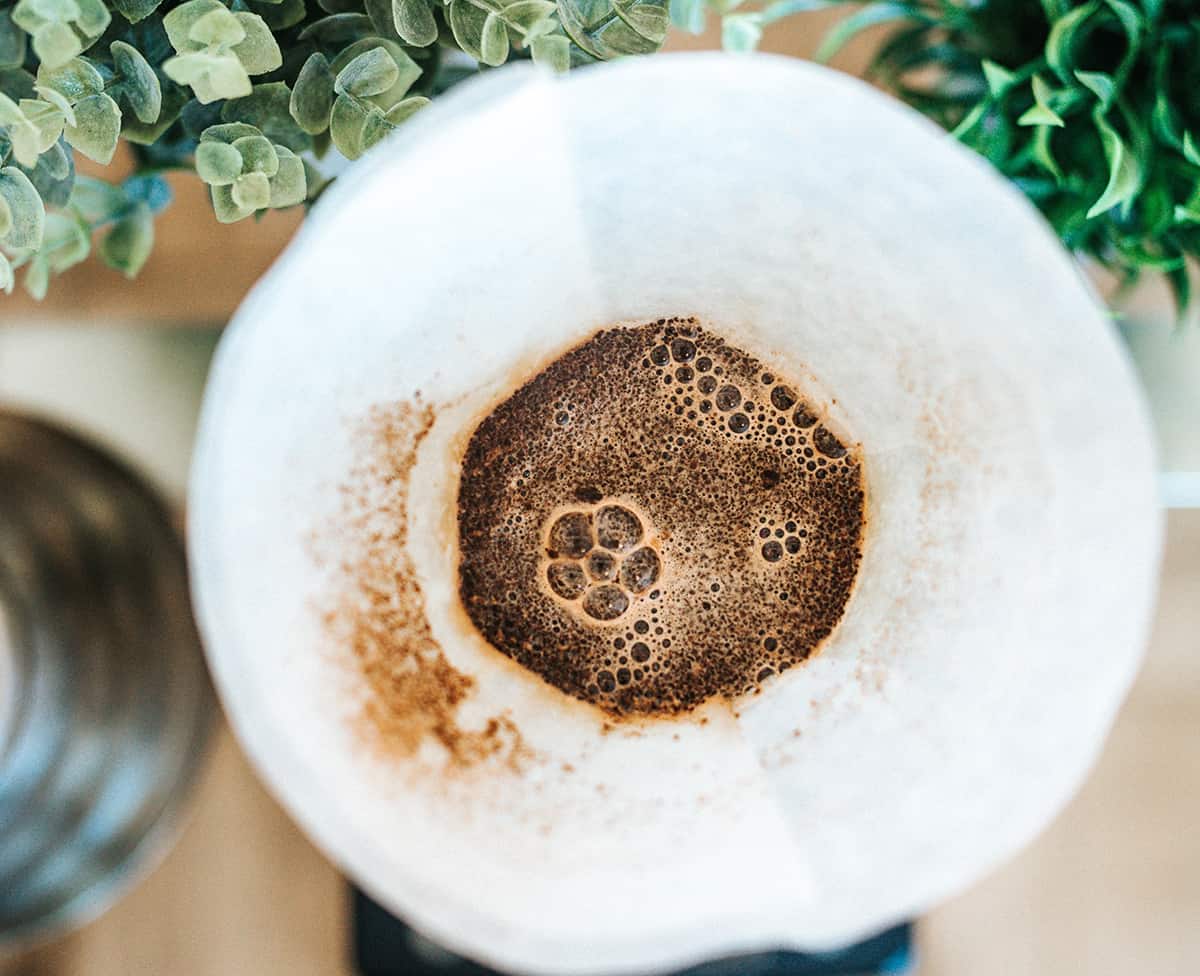Using Recycled Coffee Grounds for Your Flower Garden
Most people throw out their used coffee grounds because they think they are useless, but this couldn’t be further from the truth. Gardeners have found that mixing coffee grounds with other compost can be extremely beneficial to a flower garden. This is also extremely useful because it helps keep predators like rabbits, who eat the flowers, away from the area. If you’d like to learn how best to use your used coffee grounds to grow a successful flower garden, keep reading!
So, how can you recycle your used coffee grounds to grow a flower garden? Coffee grounds contain many beneficial nutrients that boost growth in plants, however, it’s important to find the right balance for the best growth. Mixing coffee grounds with other organic matter, such as compost, and using it as mulch is a great way to spread it evenly throughout the soil.
Also, using them as a fertilizer can be useful – simply sprinkle them onto the soil and the nutrients will slowly be released and incorporated.
Though coffee grounds can be useful for growing a flower garden, the wrong balance can make it difficult for water to filter through to the roots of the plant, and they could be harmful to your pets if there is too much. Reading this article will give you all the information you need to correctly recycle your coffee grounds into a beautiful, healthy flower garden.
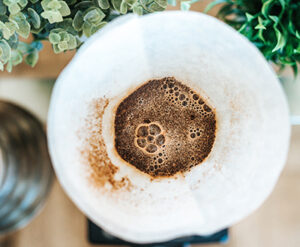
Coffee Grounds as Fertilizer
Using coffee grounds as a fertilizer will add nitrogen to the soil – which improves drainage, water retention, and aeration in the soil. In addition to nitrogen, coffee grounds also contain a good amount of potassium and phosphorus and some other micronutrients. Coffee grounds can also attract certain microorganisms that are helpful for plant growth.
The one thing to remember when using recycled coffee grounds as fertilizer is to work the grounds into the soil around the plants – this will help spread the nutrients throughout the soil, giving your plants better access to them.
Or, adding coffee grounds to your compost will be easier and much more useful. If you have your compost heap, think of coffee grounds as a “green” material (nitrogen-rich). Just be sure to balance them with enough “brown” materials (carbon-rich).
Coffee Grounds as Repellent/Pesticide
Unfortunately, flower gardens often attract unwanted pests that can damage their growth and make it very challenging to get rid of. And yet, used coffee grounds can be very helpful at repelling these pests, and even working as a natural pesticide.
Slugs, ants, snails, even rabbits, cats, and deer are often repelled by used coffee grounds in the garden. Whether it is the texture, the smell, or the caffeine that makes the coffee grounds harmful to these unwanted pests, they are an easy, inexpensive, and sustainable way to keep them from eating your flowers and destroying your garden.
When using coffee grounds as a repellent, sprinkling them on the surface of the soil is the best way to ensure that the pests keep away.
Coffee Grounds as Mulch
Mulching is one of the most beneficial ways to garden, so long as it is done correctly. While coffee grounds bring lots of nutrients to mulch, simply laying them on the top is not always helpful. Ensuring that they are spread around will limit any clumping that can turn into a barrier to water and sunlight, which eventually dries out and kills plants.
Mix your coffee grounds with other organic matter, such as compost, before using it as a mulch. You can also rake coffee grounds into the top layer of soil as a way of preventing them from clumping together.
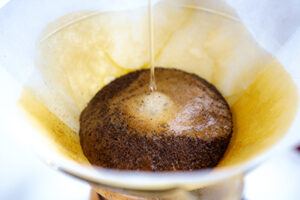
What About pH levels?
Certain plants prefer a more acidic environment, others less acidic environments are best for growth. One question many people have about using coffee grounds when gardening is they affect the pH levels of the soil. Used coffee grounds are neutral and will not affect the ph levels.
However, using fresh, unwashed coffee grounds will lower the pH, or raise the acid level, of the soil – which is great for acid-loving plants. The only thing to remember when deciding what kind of coffee grounds to add to your soil is what kind of plants you have – if they prefer an acidic environment, use fresh grounds, if you have a mix of plants, used coffee grounds will be most beneficial.
Do Fresh Coffee Grounds Have the Same Benefits as Used Coffee Grounds?
Fresh coffee grounds are not quite as helpful to use in the garden as used coffee grounds are, but in certain instances, they can be helpful. Acid-loving plants like blueberries, lilies, hydrangeas, azaleas, radishes, carrots, and others will be happy with the addition of fresh coffee grounds to the soil.
Another benefit to using fresh coffee grounds around the garden is that they are thought to suppress weeds, which can help your garden not only maintain its beauty but also give plants the room they need to grow.
In any instance, be cautious with how much of the grounds you are adding to your garden – too much is not always a good thing (whether fresh or used).
What Is the Debate About Using Coffee Grounds in the Garden?
There are several contradictory tips and beliefs about how to grow a successful flower garden, and using coffee grounds is one of the great debates. People either believe that adding coffee grounds is the most beneficial thing for your plants or it’s the worst possible thing you can do.
The most controversial idea about using coffee grounds in the garden is concerning the acidity levels in the soil and the effect of the caffeine from the grounds on the plants.
Used/spent coffee grounds that are wet and have been used to brew coffee will not affect the pH level of the soil and are better than fresh grounds because the nitrogen has higher bioavailability.
However, using caffeinated grounds could be a source of trouble if you are using them to do more than just repel unwanted pests from the garden. Plants do not like caffeine, so using decaf coffee grounds may be more useful for actual plant growth. Fresh, or dry, coffee grounds that do contain caffeine are best used as a spread on top of the soil as a means of repelling pests.
Coffee grounds are not a miracle amendment to your garden – though there are benefits, they will not magically make your garden the most amazing on the block. When you decide to add coffee grounds, think about the reason behind using them – to deter pests or to bring a nutritional additive to the soil.
Things Not to Do
Hopefully, this article hasn’t been too conflicting, but if so, here are some straight don’ts to keep in mind when gardening:
- Don’t over-mulch with fresh coffee grounds – this could suffocate the roots of plants.
- Don’t spread coffee grounds in your garden if you have wandering pets – high caffeine content can be harmful to small animals (like your dogs and cats).
- Don’t use coffee grounds to manage heavy pest infestations – a small sprinkle of coffee grounds will not control your infestation problems, you should consult with a home and garden expert.
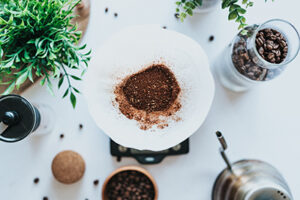
Why Do Most People Use Coffee Grounds in Their Gardens?
Honestly, the majority of people who like to and who choose to use coffee grounds in their gardens are because they drink coffee every day and are looking for a sustainable way to throw them out.
You may be surprised to know that many coffee shops will give away their coffee grounds to customers and gardeners for free as a means of reusing them rather than just throwing them away.
Another thing many people may not know is that you can take the coffee filter and add it to your compost with the used grounds – it is a material that will help balance the compost.
Takeaways
The truth is, there are many myths about using coffee grounds in the garden and it can be difficult to decide which way to go. My greatest advice is to experiment for yourself (in smaller environments) to determine if adding this step to your gardening process is beneficial or too much of a cost.
Think about the kind of plants you already have or the ones you want to grow. Are they acid-loving? If they are, consider using fresh coffee grounds mixed into your compost to help boost the soil. However, if they are not, using recycled, decaffeinated grounds may be a better idea.
If your garden is susceptible to certain harmful pests such as cats and rabbits, or other ants and slugs – sprinkle some fresh coffee grounds on the top of the soil in a light layer (so as not to obstruct water and sunlight) to repel them. But! Be sure that your pets do not have access to those areas of the garden because the caffeine can be harmful to them.
Try out coffee grounds in your garden and see for yourself if they are beneficial!

